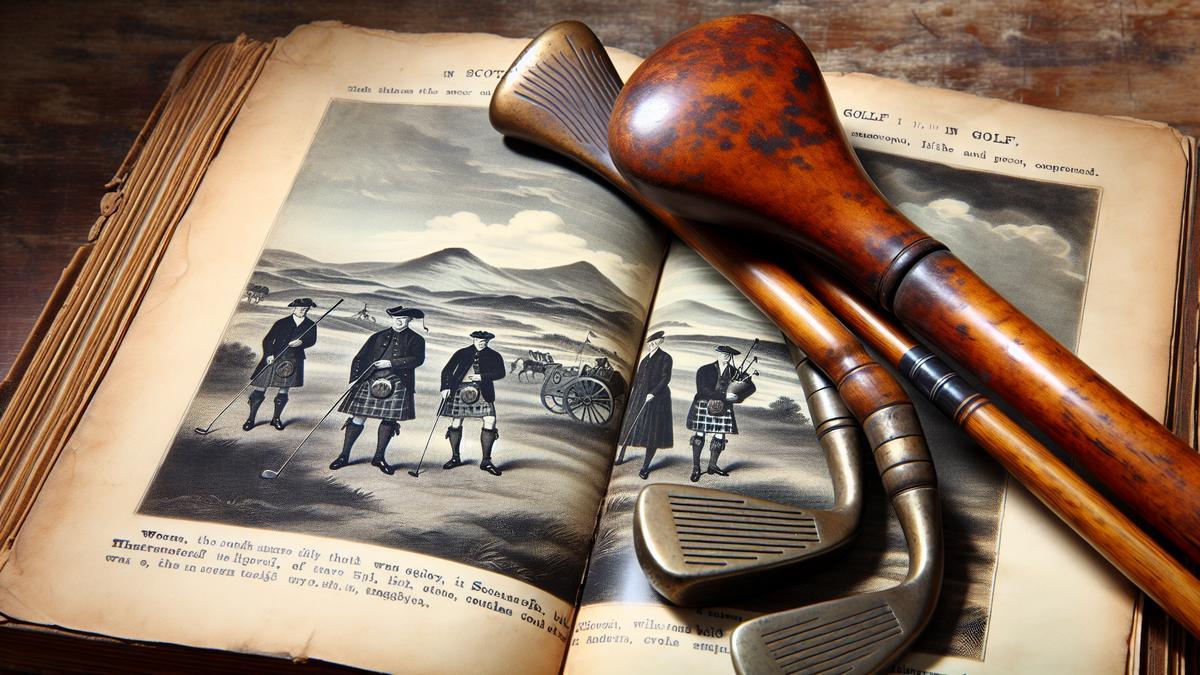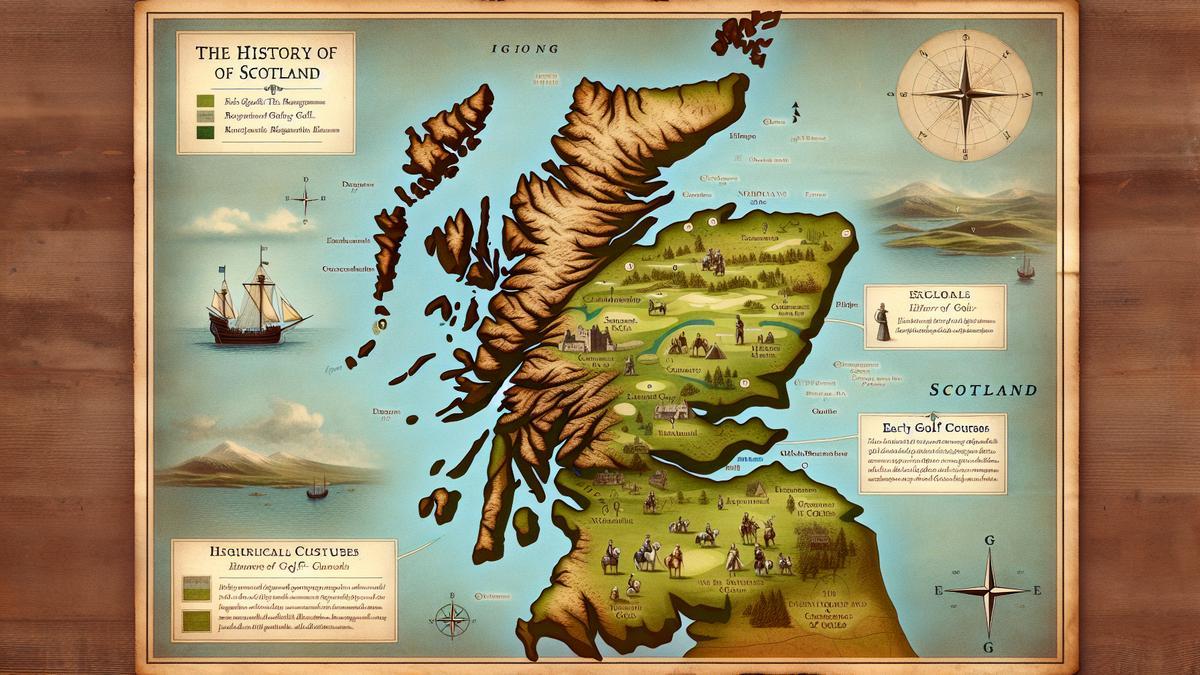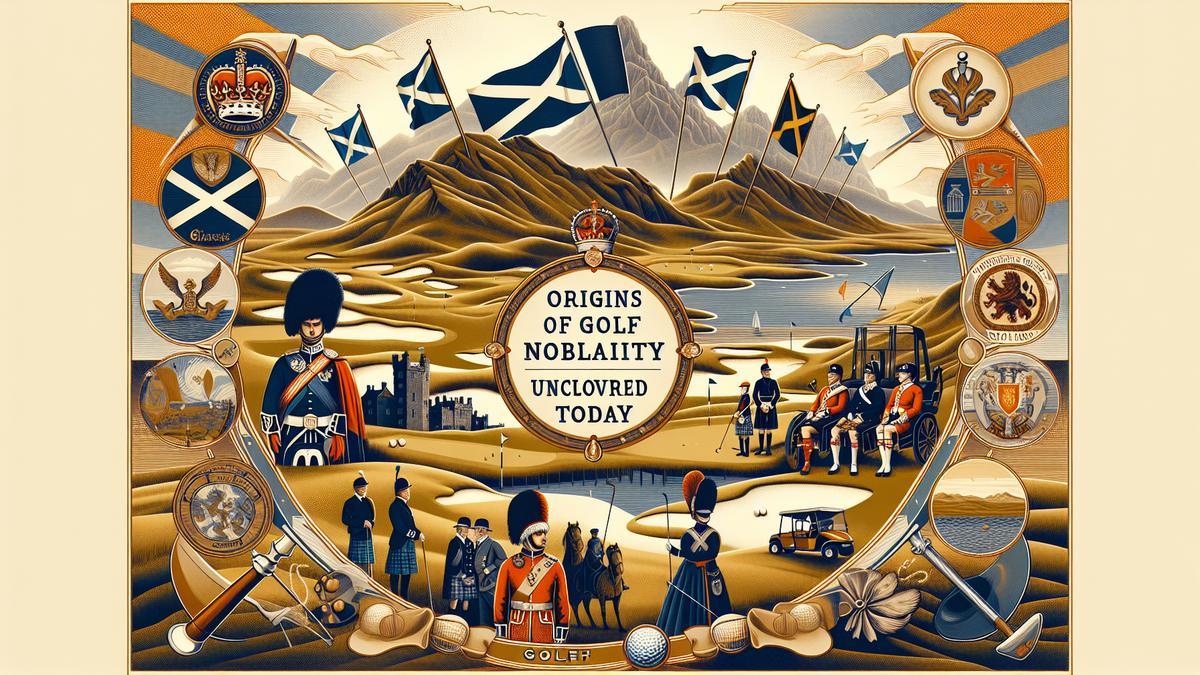The origins of golf in Scotland are a fascinating journey through time. Get ready to explore ancient golf games that shaped how you play today. Discover how Scottish culture played a huge role in golf’s beginnings and why this sport is more than just a game in Scotland. From famous courses to the evolution of equipment, you’ll find out how Scotland’s landscapes and people influenced golf around the world. So, grab your clubs and let’s tee off on this exciting adventure!
Key Takeaways
- Golf started in Scotland a long time ago.
- The first games were played with sticks and stones.
- Scots made the first golf rules in the 1400s.
- St. Andrews is known as the home of golf.
- Golf has become popular all around the world.

The Historical Roots of Golf in Scotland
Discovering Ancient Golf Games in Scotland
Golf has a rich history that traces back to Scotland. The earliest records show that people were playing games with sticks and balls as far back as the 15th century. These games were played on natural landscapes, often with little more than a few holes dug into the ground. Imagine a time when golf was just starting to take shape!
The Evolution of Golf in the 15th Century
By the 1400s, golf began to take a more defined form. The game started gaining popularity among the Scottish nobility. They would gather on the links—open areas by the coast—to play. The Scottish Parliament even tried to ban golf in 1457, as they believed it distracted soldiers from practicing archery. Can you believe that? Golf was seen as a threat to national defense!
How Early Golf Games Shaped Modern Play
The early games of golf laid the groundwork for what we enjoy today. Here’s how:
| Aspect | Early Golf Games | Modern Golf |
|---|---|---|
| Playing Surface | Natural terrain | Well-maintained courses |
| Equipment | Sticks and stones | Custom clubs and balls |
| Rules | Informal | Standardized rules |
| Players | Small groups | Large tournaments |
These changes transformed golf into a structured sport. Today, when you step onto a golf course, you’re walking on the legacy of those early games. Each swing you take connects you to the origins of golf in Scotland.
The Role of Scottish Culture in Golf’s Origins
Golf’s Birthplace: A Look at Scotland’s Influence
Golf truly began in Scotland. The windswept landscapes and rolling hills of this beautiful country set the stage for the game we love today. The origins of golf in Scotland can be traced back to the 15th century. It was here that players started hitting a small ball with a club towards a hole in the ground. This simple idea grew into the sport we enjoy now.
| Year | Event |
|---|---|
| 1457 | The Scottish Parliament bans golf because it distracted soldiers from archery practice. |
| 1500s | Golf becomes popular among the Scottish nobility. |
| 1764 | The Old Course at St Andrews is modified to 18 holes, setting a standard for future courses. |
The Cultural Significance of Golf in Scotland
Golf is more than a game in Scotland; it’s a part of the nation’s identity. People in Scotland have a deep connection to the sport. They play it on weekends, celebrate it in festivals, and even have a special day dedicated to it.
Here are a few reasons why golf matters so much in Scottish culture:
- Tradition: Golf has been played for centuries in Scotland. It’s a tradition passed down through generations.
- Community: Golf brings people together. Friends and families gather on the greens to enjoy the game and each other’s company.
- Pride: Scots take pride in their rich golfing history. They love sharing their passion with visitors from all over the globe.
Why Golf is More Than Just a Game in Scotland
In Scotland, golf is like a way of life. It’s not just about hitting a ball; it’s about connection. Whether you are a beginner or a pro, the course welcomes everyone. You can feel the spirit of the game in every swing and putt.
- Life Lessons: Golf teaches patience, focus, and respect. These lessons carry over into everyday life.
- Historical Links: Many courses are steeped in history. Walking these fairways connects you to the past.
- Beautiful Landscapes: The stunning views make every game a memorable experience.

Key Locations in the Origins of Golf in Scotland
Famous Golf Courses that Tell the Story
Golf courses in Scotland are like pages in a history book. Each one tells a story, showcasing the rich heritage of the sport. Here are a few courses that are truly special:
| Course Name | Location | Year Established | Significance |
|---|---|---|---|
| Old Course | St Andrews | 1552 | Considered the birthplace of golf. |
| Prestwick Golf Club | Prestwick | 1851 | Host of the first Open Championship. |
| Muirfield | Gullane | 1891 | Known for its challenging layout. |
| Royal Aberdeen Golf Club | Aberdeen | 1780 | One of the oldest golf clubs in the world. |
Each of these courses has its own charm and history. They are reminders of how golf has grown and changed over the years.
Exploring the Birthplace of Golf: St Andrews
St Andrews is often called the home of golf. It’s where the game began and where many golfers dream of playing. The Old Course is famous for its double greens and the iconic Swilcan Bridge. Walking on this course feels like stepping back in time.
You can also visit the British Golf Museum nearby. It showcases golf’s rich history, from its early days to the modern game. St Andrews is more than just a course; it’s a pilgrimage for golf lovers.
The Impact of Scottish Landscapes on Golf’s Development
The Scottish landscapes have played a huge role in shaping golf. The rolling hills, rugged coastlines, and natural hazards create a unique atmosphere.
These features influence how courses are designed and how the game is played. Here are some key aspects:
- Natural Terrain: Courses often use the land’s natural features.
- Weather Conditions: Wind and rain can change how you play.
- Bunkers and Hazards: These add challenges that test your skills.
The beauty of Scotland’s landscapes makes golf even more enjoyable. It’s not just about the game; it’s about the experience.
The Evolution of Golf Equipment in Scotland
How Golf Clubs Changed Over the Centuries
Golf clubs have come a long way since their early days in Scotland. Originally, players used simple sticks to hit balls made of wood or leather. As time went on, these clubs transformed into more specialized tools. By the 15th century, clubs had different shapes and sizes, designed for various shots.
| Era | Type of Club | Description |
|---|---|---|
| 15th Century | Wooden Clubs | Basic, handcrafted from local wood. |
| 17th Century | Iron Clubs | Introduced for better accuracy. |
| 19th Century | Steel Clubs | Allowed for more power and control. |
| Modern Era | Composite Clubs | Lightweight and high-tech materials. |
These changes made it easier for you to play the game and improve your skills. Each evolution in club design has aimed to help players like you hit the ball further and straighter.
The Materials Used in Early Scottish Golf Balls
In the early days, golf balls were quite different from what you use today. The first balls were made from leather and stuffed with feathers. These featheries were delicate and required careful handling. Later, in the 17th century, players began using wooden balls.
| Material | Description |
|---|---|
| Leather & Feathers | Soft, but wore out quickly. |
| Wood | More durable, but less consistent. |
| Gutta Percha | Made from rubber, revolutionized the game. |
The introduction of gutta percha balls in the 19th century changed everything. They were stronger and could be mass-produced. This meant more players could enjoy the game without worrying about their equipment breaking.
Understanding the Technology Behind Golf’s Growth
As technology advanced, so did golf equipment. The clubs and balls you use today are the result of countless innovations. From improved materials to advanced manufacturing techniques, each change has made the game more accessible.
For example, modern golf balls often have multiple layers. This design helps them fly further and react better on the green. Clubs are now made using computer-aided design (CAD), which allows for precision that was once unimaginable.
In short, the origins of golf in Scotland laid the groundwork for these exciting developments. The journey from simple sticks and leather balls to high-tech equipment has made golf a game for everyone.

The Influence of Scottish Nobility on Golf
How the Aristocracy Shaped Golf’s Popularity
Golf didn’t just pop up out of nowhere. The Scottish nobility played a huge role in making it popular. They took the game and ran with it, turning it into a social event. Imagine lords and ladies swinging clubs on lush green courses, dressed in their finest attire. This image helped golf become a sport for the elite. As they enjoyed the game, they invited others to join in, spreading the love for golf far and wide.
Notable Figures in the History of Scottish Golf
Several key figures helped shape golf into what it is today. Here’s a quick look at some of the most influential:
| Name | Contribution |
|---|---|
| Old Tom Morris | Innovated course design and greenkeeping |
| Young Tom Morris | Won multiple championships, making golf exciting |
| James Braid | Helped popularize golf in the early 20th century |
These men are just a few examples. Their passion and skill made golf more than just a pastime; they helped it grow into a beloved sport.
The Legacy of Scottish Golfers Through the Ages
The origins of golf in Scotland run deep. Golfers from Scotland have left a lasting mark on the game. Their dedication and talent inspired countless players worldwide. You could say they planted the seeds of golf, and now the sport has blossomed into a global phenomenon.
Today, when you step onto a golf course, you’re walking in the footsteps of those early Scottish players. Their spirit lives on in every swing and putt.
Golf’s Global Spread from Scotland
How Scottish Golf Traditions Influenced the World
Golf has deep roots in Scotland. The origins of golf in Scotland date back to the 15th century. The game was played on natural landscapes, often on coastal links. Scottish traditions shaped how golf is played today. The rules, the way the game is scored, and the very spirit of the game all come from Scotland. This influence can be seen in golf courses around the globe, from the rolling hills of Ireland to the sun-kissed fairways of California.
The Role of Scottish Immigrants in Spreading Golf
Scottish immigrants played a huge role in spreading golf worldwide. As they traveled, they took their love for the game with them. Here’s a quick look at how they helped golf grow:
| Country | Year Introduced | Impact |
|---|---|---|
| USA | 1888 | First golf course built in New York |
| Australia | 1894 | Popularized golf clubs and tournaments |
| Canada | 1884 | Establishment of early golf associations |
These pioneers created golf clubs and organized tournaments, introducing the game to new audiences. Their passion for golf turned it into a global sport.
The Lasting Impact of Scottish Golf on International Play
The impact of Scottish golf is still felt today. Many of the famous golf tournaments, like The Open Championship, have Scottish roots. The courses designed in Scotland inspired many international layouts. Here’s how Scottish golf has left its mark:
- Course Design: Many courses mimic the links-style found in Scotland.
- Golf Etiquette: Manners on the course, like shaking hands after a game, come from Scottish traditions.
- Equipment: The use of specific clubs and balls has its origins in Scotland.
These elements make golf a shared experience across cultures. The traditions and styles from Scotland continue to influence how the game is played today.
Frequently Asked Questions
What are the origins of golf in Scotland?
The origins of golf in Scotland date back to the 15th century. People played a game where they hit a ball with a stick. It became popular quickly!
Why is Scotland known as the birthplace of golf?
Scotland is known as the birthplace of golf because that’s where the game began. The first official golf course is in St. Andrews, and it’s famous worldwide.
What was golf like in the early days?
In the early days, golf was simple. Players used wooden clubs and were not too concerned with rules. It was all about having fun and enjoying the game.
How did golf spread from Scotland to the rest of the world?
Golf spread from Scotland through travelers and soldiers. As people visited or moved, they took the game with them, and it slowly grew globally.
Why do people still love golf today?
People still love golf today because it’s relaxing and social. It’s a great way to enjoy nature and spend time with friends. Plus, there’s always a new challenge on the course!
